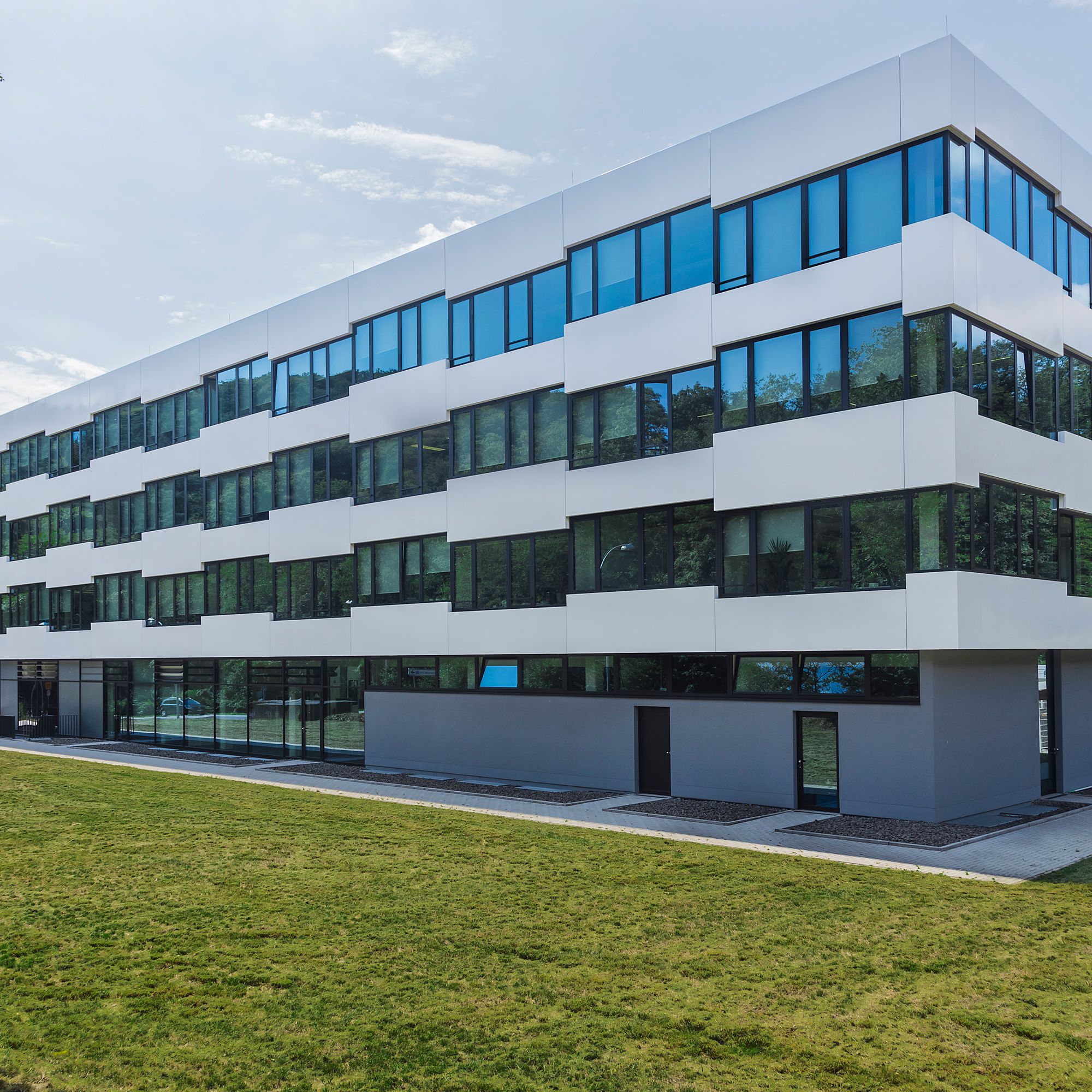The CISPA Helmholtz Center for Information Security is dedicated to the holistic research of cybersecurity, data protection, and trustworthy artificial intelligence. Based in Saarbrücken, the center offers excellent conditions for high-level research and attracts top international talent.
Through HIDA's mobility programmes, talented data scientists can contribute to making digital systems more secure, identifying emerging threat scenarios at an early stage, and developing innovative solutions for a resilient digital society at the CISPA Helmholtz Center for Information Security.

The programs
Get to know CISPA with HIDA
The CISPA Helmholtz Center for Information Security is part of the Helmholtz Association.
Data science talents can conduct research at the Center through the following programs.
The CISPA Helmholtz Center for Information Security is one of the leading research institutions for cybersecurity, data protection and trustworthy artificial intelligence in Germany and is internationally recognized for its expertise in the fields of IT security and trustworthy artificial intelligence. CISPA conducts important basic research and investigates new threat scenarios, develops innovative security solutions and contributes to making digital systems more resilient to cyber attacks. CISPA's goal is to transfer scientific findings into practical applications and to sensitize society to digital security risks.
Research priorities:
- Algorithmic foundations and cryptography
- Trustworthy information processing
- Reliable security guarantees
- Detection and prevention of cyber attacks
- Secure networked and mobile systems
- Empirical and behavioral security

The sites
Die Standorte
Helmholtz Munich ist an mehreren Forschungsstandorten aktiv:
- Neuherberg (Hauptstandort)
- Großhadern
- München Stadt
- Augsburg
- Tübingen
- Hannover
- Dresden
- Leipzig
CISPA's expertise in the field of Data Science and AI
The transformative influence of AI on the interaction between humans and software goes hand in hand with an expanded threat landscape and increasingly complex cyber threats. At CISPA, interdisciplinary teams work closely together not only to deepen their understanding of emerging digital threats and to develop innovative solutions for detecting and defending against new cyber attacks, but also to fundamentally redesign the next generation of AI systems. Security, protection and trustworthiness are at the center of this.
- Trustworthy artificial intelligence
- AI security and protection
- Causal artificial intelligence
- Privacy in foundation models
- Distributed artificial intelligence
- Sparsification of deep neural networks
More than 600 employees from over 50 countries are working together at CISPA to shape the digital security of tomorrow.
Notes on application
Notes on application
Meet some potential hosts at various Helmholtz centers and learn more about their respective data science-based research by clicking on the cards.
Please note: Please contact your potential supervisor in advance by email to suggest and discuss a research project. Only submit your application after this clarification.
If you have any questions, please email: hida@helmholtz.de
Would you like to become a Helmholtz host yourself and are looking for support for your research project? Then please also contact the above email address.
Apply now!
The Hosts at CISPA
Get to know some of the hosts at CISPA and learn more about their respective research based on data science.
Before you contact the potential hosts, please read the application instructions.
Please note: The listed hosts represent only a selection of possible supervisors.
You are also welcome to independently contact other potential hosts at the center and coordinate your participation in the HIDA Mobility Program directly with them.

Krikamol Muandet
Machine Learning
Contacts

Three-sentence summary of your group's research:
The group’s research aims at understanding the principles that enable autonomous agents to learn from past experience and interact successfully with complex environments, and to use this understanding to design new machine learning algorithms.
What could a guest researcher learn in your group? How could he or she support you in your group?
Conducting and collaborating on world-class research projects that lie at the intersection of machine learning and economics.

Yang Zhang
Learning and Intelligent Systems
Contacts

Three-sentence summary of your group's research: Yang Zhang is a faculty member at CISPA Helmholtz Center for Information Security, Germany. His research concentrates on trustworthy machine learning. Moreover, he works on measuring and understanding misinformation and unsafe content like hateful memes on the Internet. Over the years, he has published multiple papers at top venues in computer science, including CCS, NDSS, Oakland, and USENIX Security. His work has received the NDSS 2019 distinguished paper award and the CCS 2022 best paper award runner-up.
What could a guest researcher learn in your group? How could he or she support you in your group? The intern will either lead or assist in a research project conducted in the group. The intern will mainly work on the empirical side of the research, like collecting data, running machine learning models, etc.
What could a guest researcher learn in your group? How could he or she support you in your group? The guest researcher could learn experiences from our research domains and learn each other.

Franziska Boenisch
Trustworthy Machine Learning
Contacts

Three-sentence summary of your group's research: Our group, the SprintML lab focuses their research on Secure, Private, Robust, INterpretable, and Trustworthy Machine Learning. We make sure that data processing through machine learning models respects the privacy of their training data, and that after training, the model makes robust, secure, and interpretable predictions.
What infrastructure, programs and tools are used in your group? We rely on high performance computing infrastructure and GPU clusters from the Helmholtz association. Our software is mainly developed in Python and deployed to the GPU clusters in form of GitHub containers.
What could a guest researcher learn in your group? How could he or she support you in your group? A participant under the Visiting Researcher Grant will learn how to automatically process data and manage information through the lens of trustworthy machine learning. The participant will be given the opportunity to discover the risks to machine learning privacy, robustness, and security that arise from the data itself or the training procedure. They will explore mitigation methods to the most crucial risks, and get the chance to implement those themselves, or expand them to new contexts. Finally, the participant can extend their knowledge on publishing academic results in the area of trustworthy machine learning, and will, in the best case, contribute to a paper submission to a top tier machine learning conference. We welcome all participants with a background in machine learning, and an interest in developing data processing that goes beyond considering only utility of the resulting application.

Rebekka Burkholz
Relational Machine Learning
Contacts

Three-sentence summary of your group's research: Our main goal is to reduce the computational costs associated with deep learning based on algorithmic innovations and theoretical insights with practical implications. We particularly enjoy tackling problems that involve graph based data. Most of the applications that motivate us are in the biomedical domain or economics ranging from modeling gene regulatory dynamics, gaining insights into cancer drivers, understanding sex differences, or analyzing systemic risk in international food trade.
What infrastructure, programs and tools are used in your group? As a lot of our projects involve deep learning and neural network sparsification, we make use of GPU clusters.
What could a guest researcher learn in your group? How could he or she support you in your group? We would be happy to collaborate on interesting applications as well as method development in the machine learning domain.

Adam Dziedzic
Machine Learning
Contacts

Three-sentence summary of your group's research: Our research is focused on secure and trustworthy Machine Learning as a Service (MLaaS). We design robust and reliable machine learning methods for training and inference of ML models while preserving data privacy and model confidentiality. We are focused on the state-of-the-art ML methods and models, such as, self-supervised learning, large language and vision models (LLMs), foundational models.
What infrastructure, programs and tools are used in your group? We use large scale GPU clusters and program in the latest ML frameworks.
What could a guest researcher learn in your group? How could he or she support you in your group? As a guest researcher you can learn how to use tools from data privacy and model confidentiality to enable trustworthy machine learning. We also support our guests with theoretical analysis as well as running large scale experiments to publish at the top ML conferences.



